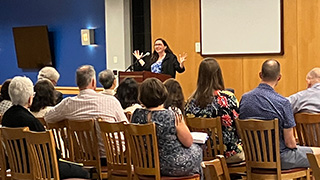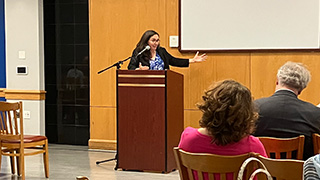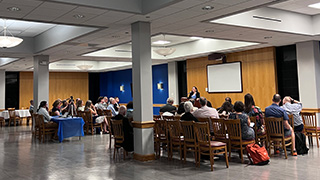Humanities Colloquium Hosts Zena Hitz Ph.D.
Wednesday, September 20, 2023
 On Thursday, September 7, Seton Hall faculty members across the liberal arts disciplines gathered in the University
Center Chancellor’s Suite for the second annual Humanities Colloquium. This year’s
afternoon of fellowship, lecture and discussion featured as its key speaker Zena Hitz,
Ph.D., a Tutor at St. John’s College and the author of Lost in Thought: The Hidden Pleasures of an Intellectual Life as well as her most recent book A Philosopher looks at the Religious Life.
On Thursday, September 7, Seton Hall faculty members across the liberal arts disciplines gathered in the University
Center Chancellor’s Suite for the second annual Humanities Colloquium. This year’s
afternoon of fellowship, lecture and discussion featured as its key speaker Zena Hitz,
Ph.D., a Tutor at St. John’s College and the author of Lost in Thought: The Hidden Pleasures of an Intellectual Life as well as her most recent book A Philosopher looks at the Religious Life.
Hitz has published numerous essays (in journals including Commonweal, Plough Quarterly, First Things, and The Imaginative Conservative) and contributed to multiple podcasts on topics surrounding freedom in the intellectual life and the value of liberal education. She is also the founder and president of the Catherine Project, a great books reading program aiming to connect and build networks of serious readers and thinkers, fostering communities that love learning for its own sake.
Having devoted so much of her academic career to reflecting on the fundamental purpose of studying the liberal arts and examining the ways in which the desire for such an education is acquired and fulfilled, Hitz is a strong voice in the contemporary conversation around the fate of humanities at the university. Attendees at the Humanities Colloquium were eager to hear her insights concerning this highly relevant theme from her book: the question of what the mission of a university is, and what the central activity of teaching and learning consists of.
 According to Hitz, "The desire to learn is an active, inbuilt power" —a capability
that is natural to the human person, but not automatic. Therefore, education itself
is an outgrowth of an organic process, and the task of teachers is to bring about
the conditions necessary for learning to flourish. To tease out the elements of this
ideal setting, Hitz described the intellectual lives of characters who also appear
in her book Lost in Thought, both historical and fictional. In tracing the commonalities between them, she identified
four fundamental requirements for authentic learning: a teacher or mentor who not
only provides content but serves as a guide; books that invite and display a world
in which we think and inquire; a library, that is, a selection of such materials covering
subjects in both breadth and depth; and finally, an environment conducive to reflection
and focus, nurturing the student’s freedom and growth.
According to Hitz, "The desire to learn is an active, inbuilt power" —a capability
that is natural to the human person, but not automatic. Therefore, education itself
is an outgrowth of an organic process, and the task of teachers is to bring about
the conditions necessary for learning to flourish. To tease out the elements of this
ideal setting, Hitz described the intellectual lives of characters who also appear
in her book Lost in Thought, both historical and fictional. In tracing the commonalities between them, she identified
four fundamental requirements for authentic learning: a teacher or mentor who not
only provides content but serves as a guide; books that invite and display a world
in which we think and inquire; a library, that is, a selection of such materials covering
subjects in both breadth and depth; and finally, an environment conducive to reflection
and focus, nurturing the student’s freedom and growth.
The lecture portion of the event was followed by a lively Q-and-A. Faculty members fielded their wide-ranging responses, from the practical—the roles of grading systems, libraries, and tech-free spaces in on-campus learning—to the abstract, exploring the very concept of knowledge and the ideal of freedom in liberal learning. In the colloquium’s collegial setting, participants had the opportunity to think creatively about the issues raised and consider questions from the vantage points of their colleagues’ various humanities backgrounds. Through her emphasis on "the language of learning as ecology", Hitz encouraged her fellow academics to embrace with humility the challenges of teaching and studying the liberal arts, and not shy away from the goal of cultivating an environment where the seeds of desire for genuine, transformative learning can take root.
Mary Balkun, Ph.D., professor in the English department and Director of the Center for Faculty Development, shared her thoughts on the event: "I found Hitz’s talk to be inspirational and timely. At a time when those of us in the humanities continue to have to defend what we do and convince students of their value, Hitz provided a moment of celebration. I loved her book, and her talk reminded me of all the reasons why."
 Matthew Higgins, director of programs at the Center for Catholic Studies, said, "It has been a blessing to witness the collaboration between the Center for Faculty Development, Center for Catholic Studies, Arts and Sciences, and the many departments who co-sponsored the event for the second year in a row.
It was inspiring to see such a diverse group of faculty sitting alongside administrators,
engaged in discussion about the importance of liberal education and creating a campus
culture wherein creative learning can flourish. Such an environment is crucial to
engaging the Catholic Intellectual Tradition at Seton Hall and I look forward to seeing
this type of collaborative conversation continue."
Matthew Higgins, director of programs at the Center for Catholic Studies, said, "It has been a blessing to witness the collaboration between the Center for Faculty Development, Center for Catholic Studies, Arts and Sciences, and the many departments who co-sponsored the event for the second year in a row.
It was inspiring to see such a diverse group of faculty sitting alongside administrators,
engaged in discussion about the importance of liberal education and creating a campus
culture wherein creative learning can flourish. Such an environment is crucial to
engaging the Catholic Intellectual Tradition at Seton Hall and I look forward to seeing
this type of collaborative conversation continue."
The colloquium was sponsored by the Dean of Arts & Sciences, the Center for Faculty Development, and the Center for Catholic Studies, with the Departments of History, English, Philosophy, CORE, LLC, Religious Studies, Catholic Studies, and Immaculate Conception Seminary School of Theology. The first 30 registrants received their own copy of Lost in Thought.
Categories: Arts and Culture, Faith and Service






